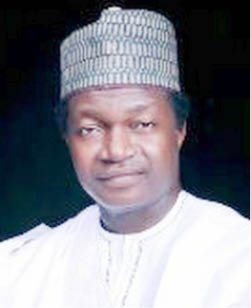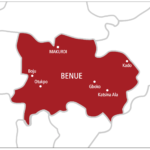In this interview with Trust TV, Agoso Bamaiyi, a development strategist and social entrepreneur who works in the humanitarian, development and peace sector, says Nigeria stands the risk of losing communities on the Benue plain if the river is not dredged and the abandoned Dasin Hausa buffer dam in Adamawa State is not constructed.
What is your perspective on the River Benue and the recent flooding in Nigeria?
The flooding hasn’t been like this from the beginning. We have communities which have been here for over 300 years, and for most of this time, they have lived with the river peacefully; the relationship has been symbiotic. The river has helped to prosper the people. The life of the people revolves around fishing, farming and hunting. They hunt not only animals on the highland, but also aquatic animals like hippos, crocodiles and birds.
- Buhari, Obasanjo, Atiku, others mourn as Nigeria’s first aviation minister, Mbazulike Amechi dies at 93
- Osun guber poll: Tribunal admits Oyetola’s documentary evidence
However, in 1977, Cameroun started building a dam on the course of the River Benue. It came about when the Chinese approached Cameroun and told them that they would build a dam for them free of charge which they could use for generating electricity, eco-tourism and irrigation. What China wanted to do was to use Cameroun as a guinea pig. Of course they have the technology and the know-how to build dams, but they didn’t have the experience. They also didn’t want to outsource contracts to foreign countries. They finished the dam in 1982. They gained the experience they were looking for, went back to China and used it to build dams across China. The biggest dam in the world is in China today.
After the Lagdo Dam in Cameroon was finished in 1982, they closed the locks, what are technically called sluices, so that water can come in and collect all across the dam area, forming what is today known as the Lagdo Lake or Lagdo Reservoir. It took two years, between 82 and 84, before the dam filled up. While the dam was filling up, the water in River Benue dropped. I was a young man in Numan LGA, Adamawa State, at that time and we talked about it frequently. We were not sure what was happening, but now I know what happened.
After 85 we had the first flooding in 86. The dam had filled up, there was heavy rainfall that year and the water was too much for the dam and they had to open the sluices to release water into the Benue trough. And so we had a lot of water coming in at once; not the natural flow of the river, because the dam affected the natural flow of the river. That was the beginning of flooding, and it kept getting worse.
In addition to that, the Kiri Dam was built on the River Gongola, which is a tributary of River Benue. Incidentally, Kiri Dam was also finished and commissioned in 1982. The reason for building Kiri Dam was to serve as a source of water for the Savannah Sugar Company which was established in 1975. The company had about 33 hectares of plantation and it needed water to take care of the plantation.
Lagdo and Kiri dams, therefore, affected the flow of River Benue and water was not flowing with its natural volume.
There are tributaries feeding the River Benue. These are seasonal rivers. During the dry season, they are dry and sandy, while in the rainy season water flows from them, accompanied by a lot of sand into the River Benue.
River Gongola, River Faro, River Taraba, River Donga, River Katsina-Ala, among other smaller rivers, feed the River Benue. What happens is that the Benue accumulates sand which fills up its trough. So over the years, when there was heavy rainfall, either of the dams needed to release water and the water flowed down the trough, and because the trough is no longer deep, the water just flows into communities and into households while washing away farms.
Like you have been told by the people themselves, this year is the worst. People have lost farms, livelihoods, homes, animals and their lives.
The question always is, what is the solution to this? Government officials will tell you that communities should move to higher grounds. But I have told you that the communities and the river had lived peacefully for hundreds of years until man intervened and built dams on the rivers.
So the problem is man-made and man is the one to solve it.
There are two basic solutions: number one is that River Benue has to be dredged. If that is not done, no matter what we do, we will always have flooding.
The second is that when the process for the building of the Lagdo Dam was going on, the Environmental Impact Assessment (EIA) study was done by the company and a recommendation was made to the Nigerian government to build a buffer dam in Dasin Hausa. The reason for that is that it will receive excess water from the Lagdo Dam and release same into the Benue trough at its natural strength and in its natural volume so that the river will continue to flow naturally. This dam should have been built since, but it has not been built. Lots of legislation, lots of agitations; we have spoken about this over and over and the government has done nothing about it. Until you dredge the Benue and build the Dasin Hausa dam, we will always have flooding.
The solution is not in asking the people to move to high grounds. If we are to resettle all these communities, the money to resettle them will be enough to dredge the river and build the dam. Because we are talking about recreating entire communities and these are hundreds of communities in Adamawa, Taraba, Benue and Kogi states. So the best thing is to dredge the Benue and also to build the Dasin Hausa dam. If that is not done, this thing will get worse and worse, and who knows, eventually it might affect Yola, Numan, Makurdi and other major cities. Perhaps, it is then that we will take action.
Do you think corruption is responsible for the non-dredging of the river?
From what I know, contracts for the dredging of River Benue have been given out three times. First, under Abacha, then under Jonathan and then of course 2019-2020. I understand that the initial releases were made and then nothing happened. Of course, you cannot rule out corruption and what we keep saying government policy.
You have a fantastic policy in place but the execution is always bad and you keep having policy summersault. So the Nigerian factor certainly is the reason why communities continue to suffer.
There’s nowhere in the world where communities will be suffering like this and the government does not do anything about it. All That government has been doing, year after year, when we have flooding and this extensive suffering, they will come in later with relief materials, and sometimes the relief materials are not enough to take care of the challenges of the people. It’s just something small to make the people feel like they have a government.
What do you think is the aspect of the economy most affected by the flooding?
We have serious economic effects from the whole thing. Right where we are sitting, you will see a foundation concrete. It used to be a river port and we had vessels coming from Lagos to Lokoja bringing in goods to and barges and ships all the way to Numan. And we had ships coming in from Garua in Cameroon and other Nigerian communities upstream to carry these goods from here.
UTC was also based here in Numan with their warehouses. So there was strong business here. That cannot happen now because the Benue has filled up with sand and you cannot navigate it. If we dredge it, we will return navigability to the river; which means we will have ships bringing in heavy goods through the river instead of all these trailers on the roads carrying heavy goods. The weight of the trailers make our roads not to last long.
Also, they cause a lot of accidents. We lose a lot of souls. We can reduce the accidents and our roads can last longer if we move heavy goods like cement and iron rods through the river.
One more thing, Numan and Lamurde are the leading producers of rice. You don’t hear much about it, but the rice that comes out of Lamurde is far more than most communities in Nigeria. If you are counting the top 10 rice producing communities in Nigeria, you must mention Lamurde because of the amount of rice that comes out of there. So these communities contribute to the feeding of Nigeria and to the prosperity of Nigeria, but this constant flooding is affecting this and affecting the economy of Nigeria.
What do you think will be the future of the people if the River Benue is not dredged as soon as possible?
If we do not dredge the River Benue and construct the Dasin Hausa dam, I am afraid that we may lose not only the communities on the Benue plain, but also several states, because the way it is going, even places where you did not have floods before, you will begin to have floods. That’s why I mentioned places like Yola, Numan and Makurdi that sit on the bank of the river. So it is going to become much worse and cause greater problems and we will spend a lot more taking care of it. So if we want to do the right thing, spend less to take care of it now than to wait until there is catastrophe and then you spend a lot to take care of it.



